
The benefits of yoga and meditation in rehab programs
Harnessing Inner Strength through Mind-Body Techniques
In recent years, the incorporation of yoga and meditation into rehab programs has gained recognition for their holistic benefits. These practices serve as powerful adjuncts to traditional treatments, addressing the physical, emotional, and mental dimensions of recovery. By fostering mindfulness, resilience, and physical well-being, yoga and meditation cultivate a supportive environment that enhances long-term sobriety and mental health, making them invaluable components of comprehensive addiction treatment.
A Holistic Approach to Addiction Recovery through Yoga and Meditation
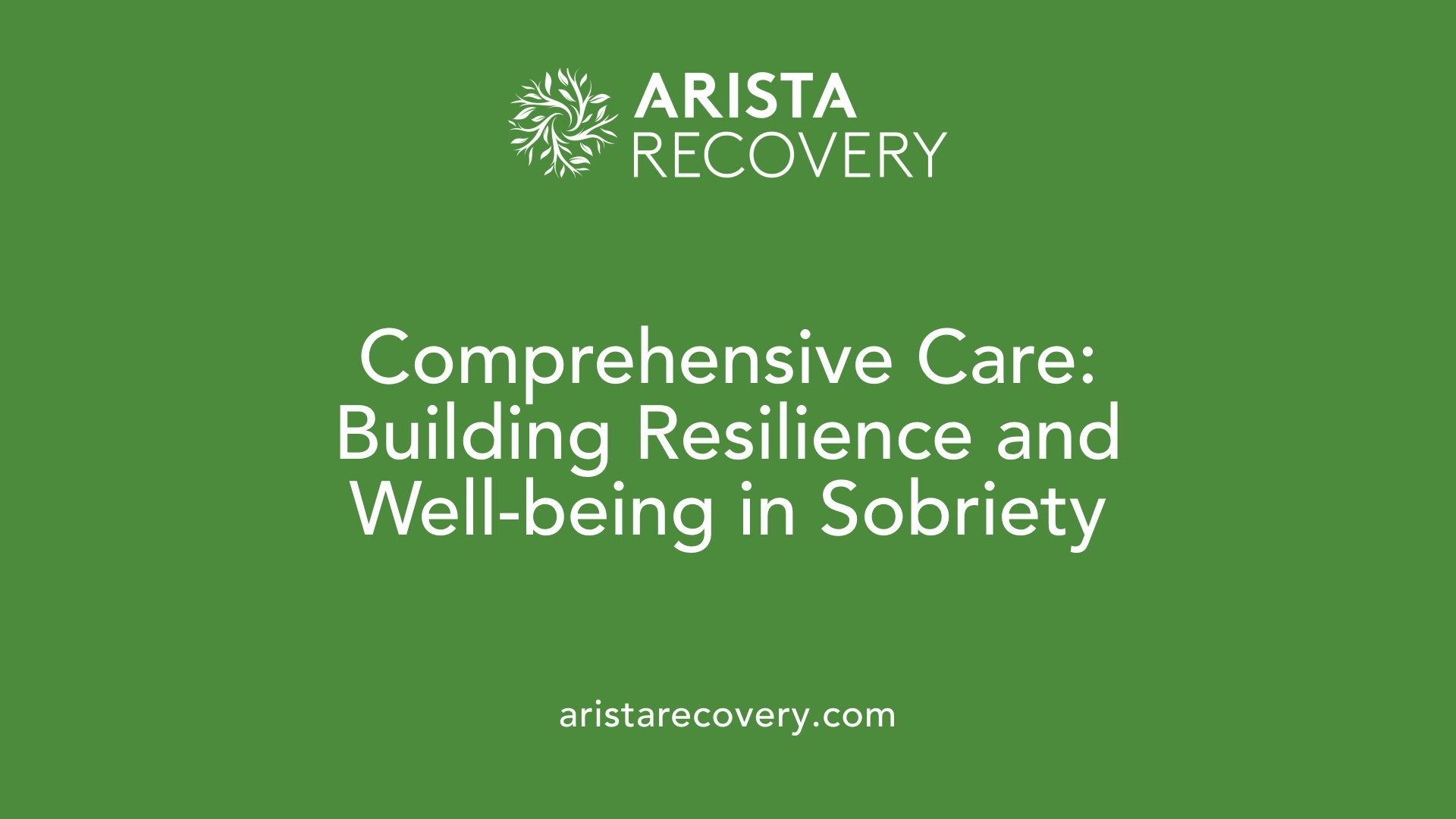
What is the holistic approach to rehab that utilizes yoga and meditation to enhance physical, emotional, and mental health?
A holistic method in addiction recovery combines yoga and meditation to treat the whole person—body, mind, and spirit. This approach prioritizes addressing physical health, emotional resilience, and mental clarity all at once. It integrates specific yoga practices like trauma-sensitive yoga, which is gentle and mindful, helping individuals reconnect with their bodies and release stored tension.
Practitioners often incorporate mindfulness meditation, which enhances self-awareness, helps regulate emotions, and cultivates inner strength. These practices are usually adapted to suit the individual's needs, often facilitated by certified professionals trained in addiction and mental health support.
In addition to traditional therapies such as counseling and medication, this approach offers tools like breathwork, physical postures, guided imagery, and philosophical study. These techniques work together to reduce stress, improve mood, and foster emotional stability.
Overall, the goal of this comprehensive approach is to build resilience. By strengthening the physical body and calming the mind, individuals are better equipped to handle cravings and emotional triggers, reducing the risk of relapse. The combination creates a supportive environment that nurtures long-term sobriety and overall well-being.
Techniques and Styles of Yoga and Meditation Used in Rehab Settings
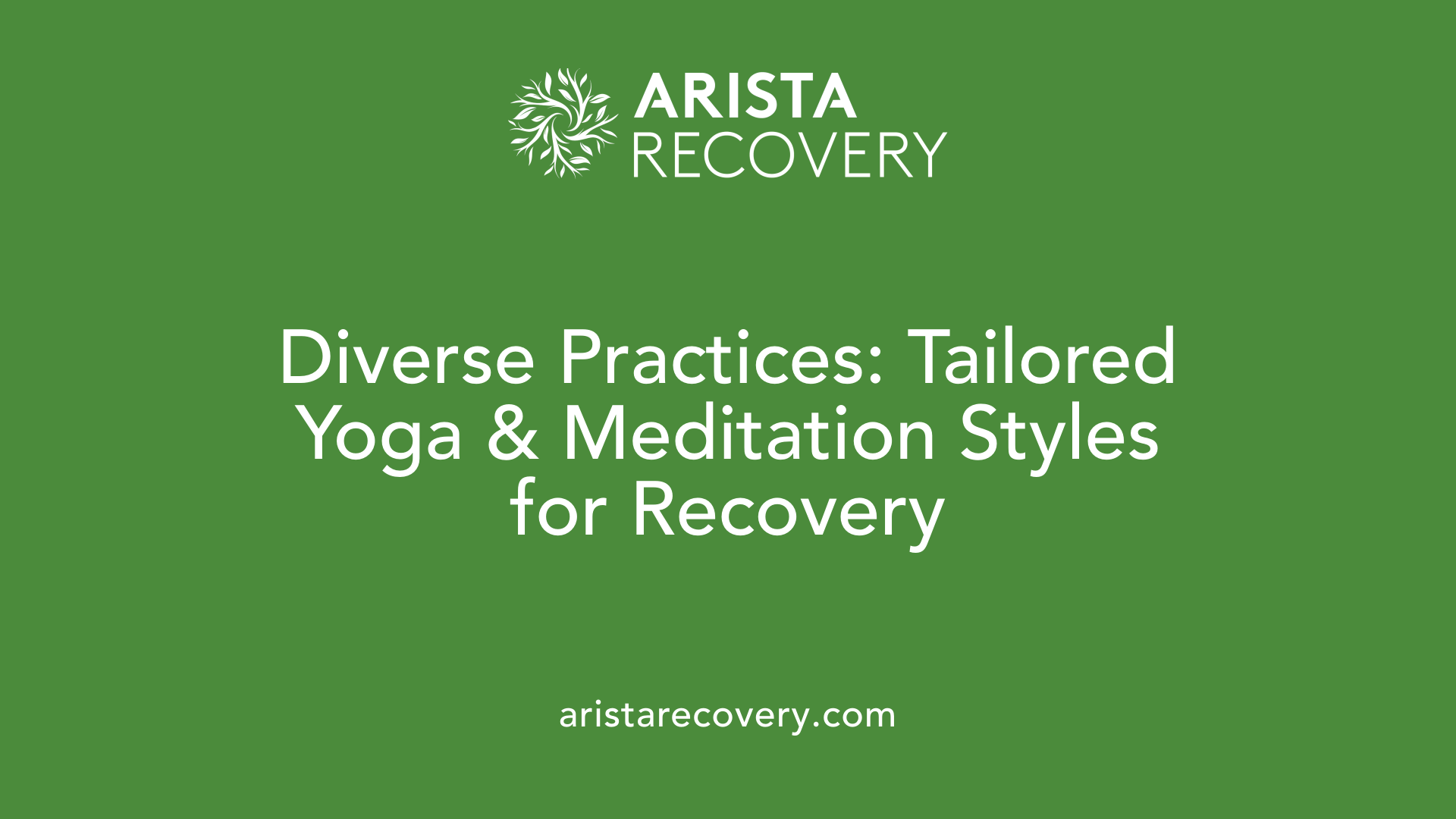
What techniques and styles of yoga and meditation are used in rehab settings?
Rehabilitation programs increasingly incorporate a variety of yoga styles and meditation techniques to support individuals through the complex process of addiction recovery. These practices are tailored to meet diverse needs, from physical health to emotional stability.
Among the most common yoga styles used are Hatha, Vinyasa, Yin, Bikram, and Kundalini yoga. Each has unique features that contribute to recovery:
- Hatha Yoga emphasizes slow, deliberate movements and breath control, helping build strength and flexibility while calming the mind.
- Vinyasa Yoga involves fluid sequences of poses synchronized with breath, promoting mindfulness and physical resilience.
- Yin Yoga is gentle, focusing on deep tissue relaxation and connective tissue health, which supports better sleep and emotional release.
- Bikram Yoga involves a series of poses performed in a heated room, aiding detoxification, circulation, and joint comfort.
- Kundalini Yoga combines physical movements, rhythmic breathing, and chanting to awaken spiritual awareness and emotional healing.
Breathwork exercises, particularly pranayama, are integral to these practices. Pranayama includes techniques like deep diaphragmatic breathing, alternate nostril breathing, and breath retention, which help activate relaxation responses, lower stress hormone levels, and manage cravings.
Guided meditation and mindfulness practices form another cornerstone of rehab programs. These techniques teach participants to observe their thoughts and emotions without judgment, increasing self-awareness and emotional regulation. Body scan meditations and guided imagery help patients release tension, process trauma, and improve focus.
Trauma-sensitive yoga and body scan meditations are especially beneficial for individuals with a history of emotional or physical trauma. They create a safe space for healing by promoting gentle movement and awareness of bodily sensations.
Overall, these diverse practices form a comprehensive toolkit that addresses the physical, psychological, and spiritual aspects of addiction. By engaging in regular yoga and meditation, individuals can better manage stress, decrease cravings, improve mental clarity, and foster resilience—factors all vital to sustaining long-term sobriety.
For more detailed information, searching terms like "yoga styles meditation rehab therapy" can provide insights into specific practices tailored for recovery settings.
Supporting Recovery and Enhancing Well-Being through Yoga and Meditation
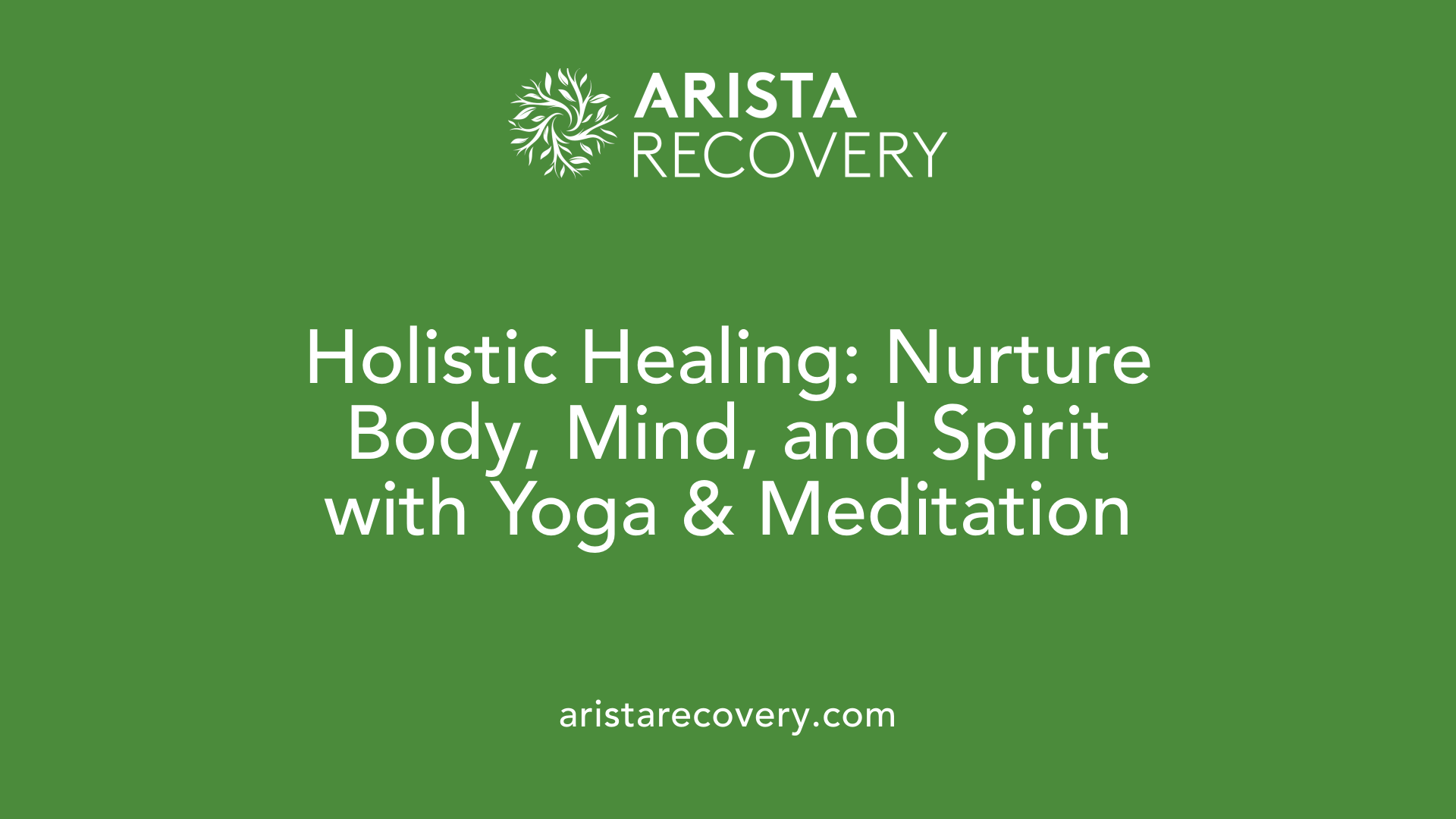
How do yoga and meditation support the recovery process and improve overall well-being?
Yoga and meditation play a significant role in addiction recovery and mental health by encouraging mindfulness, emotional stability, and physical resilience. These practices activate the parasympathetic nervous system, which helps the body relax and reduces stress hormones like cortisol. As a result, individuals experience a calming effect, alleviating anxiety and depressive symptoms that often accompany mental health conditions.
Research supports that yoga and meditation can elevate neurochemicals such as gamma-aminobutyric acid (GABA), serotonin, and dopamine. GABA, in particular, acts as a natural tranquilizer, reducing anxiety and stress, while increased serotonin levels enhance mood and overall emotional well-being. These neurochemical boosts not only diminish mental health symptoms but also support brain plasticity, improving cognitive functions and emotional regulation.
Moreover, regular engagement in these practices fosters self-awareness and acceptance, enabling individuals to recognize early signs of relapse or emotional distress. This heightened awareness helps in developing healthier coping strategies to manage cravings and triggers. In particular, meditation practices like body scans and mindful breathing cultivate a sense of calm and presence, which are essential during stressful moments or withdrawal phases.
In addition to psychological benefits, yoga and meditation enhance physical health by improving flexibility, strength, and overall vitality. They can reduce symptoms of associated conditions such as PTSD, anxiety disorders, and depression, providing a holistic approach to recovery. These practices are accessible and adaptable, suitable for all ages and fitness levels, making them valuable tools in comprehensive addiction programs.
In conclusion, incorporating yoga and meditation into recovery routines offers a natural, drug-free means to improve mood, reduce stress, and build resilience, supporting long-term sobriety and overall well-being.
More information about yoga, meditation, and mental health recovery
Search query: yoga meditation mental health recovery.
Scientific Evidence and Integration into Treatment Plans
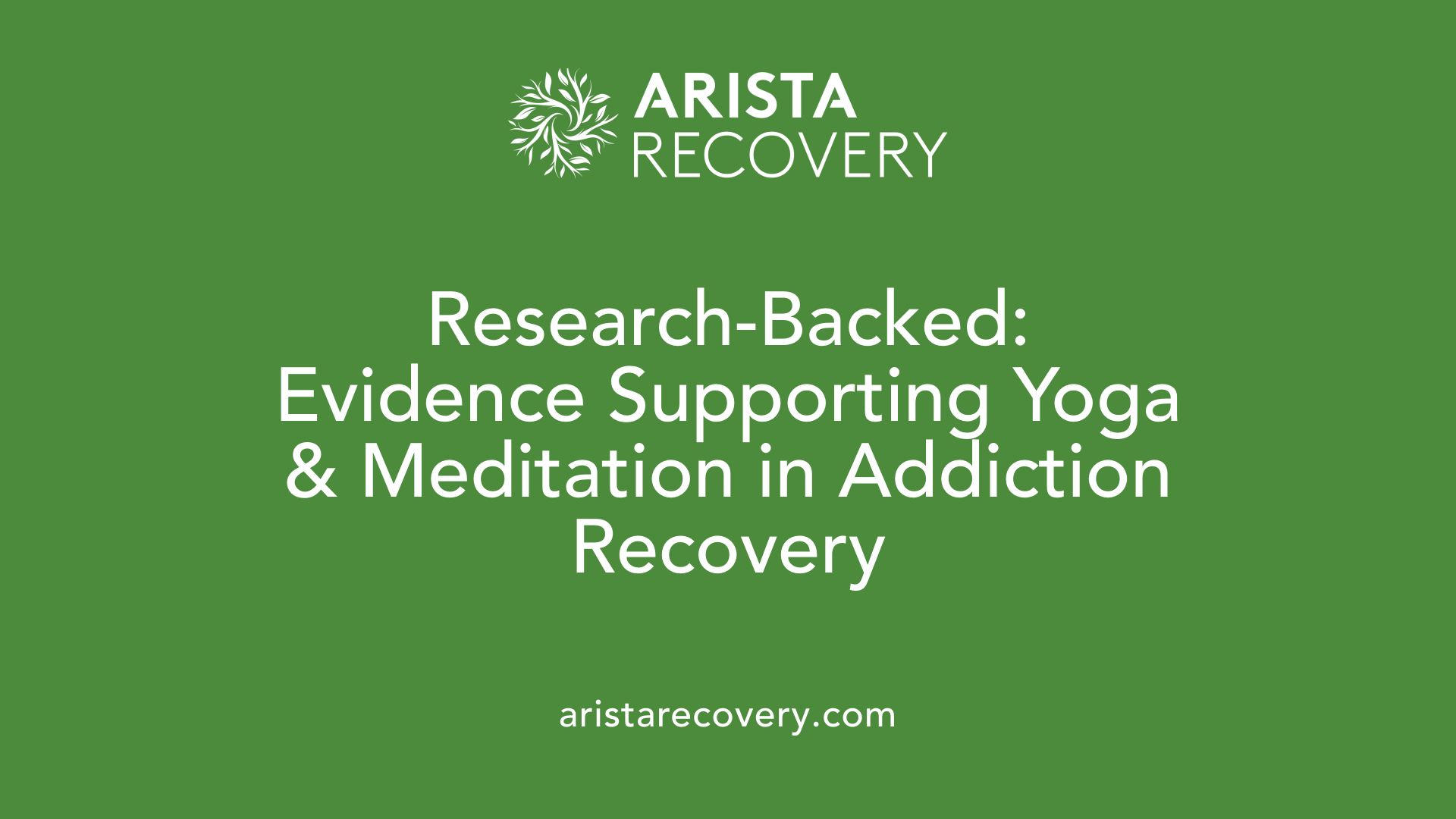
Which studies support the use of yoga and meditation for addiction recovery?
Recent research underscores the effectiveness of yoga and meditation as supportive tools in addiction treatment. Clinical trials demonstrate that these practices help reduce cravings, stress, and emotional reactivity. For instance, studies on Mindfulness-Based Relapse Prevention (MBRP) and Mindfulness Oriented Recovery Enhancement (MORE) report significant declines in substance use and relapse rates among participants.
Neuroimaging and laboratory research reveal that yoga and meditation influence brain chemistry by modulating key networks involved in self-control, reward, and emotional regulation. These include the default mode network, which governs self-referential thinking, and reward-related brain regions such as the nucleus accumbens. Such modulation can decrease the intensity of cravings and improve emotional stability.
How do yoga and meditation work at a biological level?
Practicing yoga and meditation triggers physiological changes that support recovery. They lower cortisol levels, a hormone associated with stress, and enhance parasympathetic nervous system activity, promoting relaxation and emotional calm. These practices also increase the production of GABA neurotransmitters, which are natural calming agents that help reduce anxiety and depression.
Furthermore, they boost inhibitory control in the brain, helping individuals resist compulsive behaviors. This neurochemical balance bolsters resilience and aids in maintaining sobriety during stressful situations.
Are yoga and meditation used alongside other treatments?
Yes, both are integrated as complementary components in holistic recovery programs, often alongside medication and counseling. They enhance the overall effectiveness by improving emotional regulation, self-awareness, and stress management. Structured programs incorporating yoga and meditation have shown higher engagement and better outcomes, like improved mood and decreased relapse risk.
Examples of successful programs include:
- Yoga and mindfulness classes incorporated into outpatient rehab settings.
- Specialized yoga interventions like Sudarshan Kriya Yoga demonstrating benefits in mood and quality of life for individuals with opioid use disorder.
- Community-based yoga programs targeting at-risk populations, including women with PTSD and individuals in detox.
These examples illustrate that integrating yoga and meditation into treatment plans can foster long-term recovery by strengthening mental resilience, reducing physiological stress responses, and promoting healthier lifestyle choices.
Long-term Benefits: Relapse Prevention and Overall Well-Being
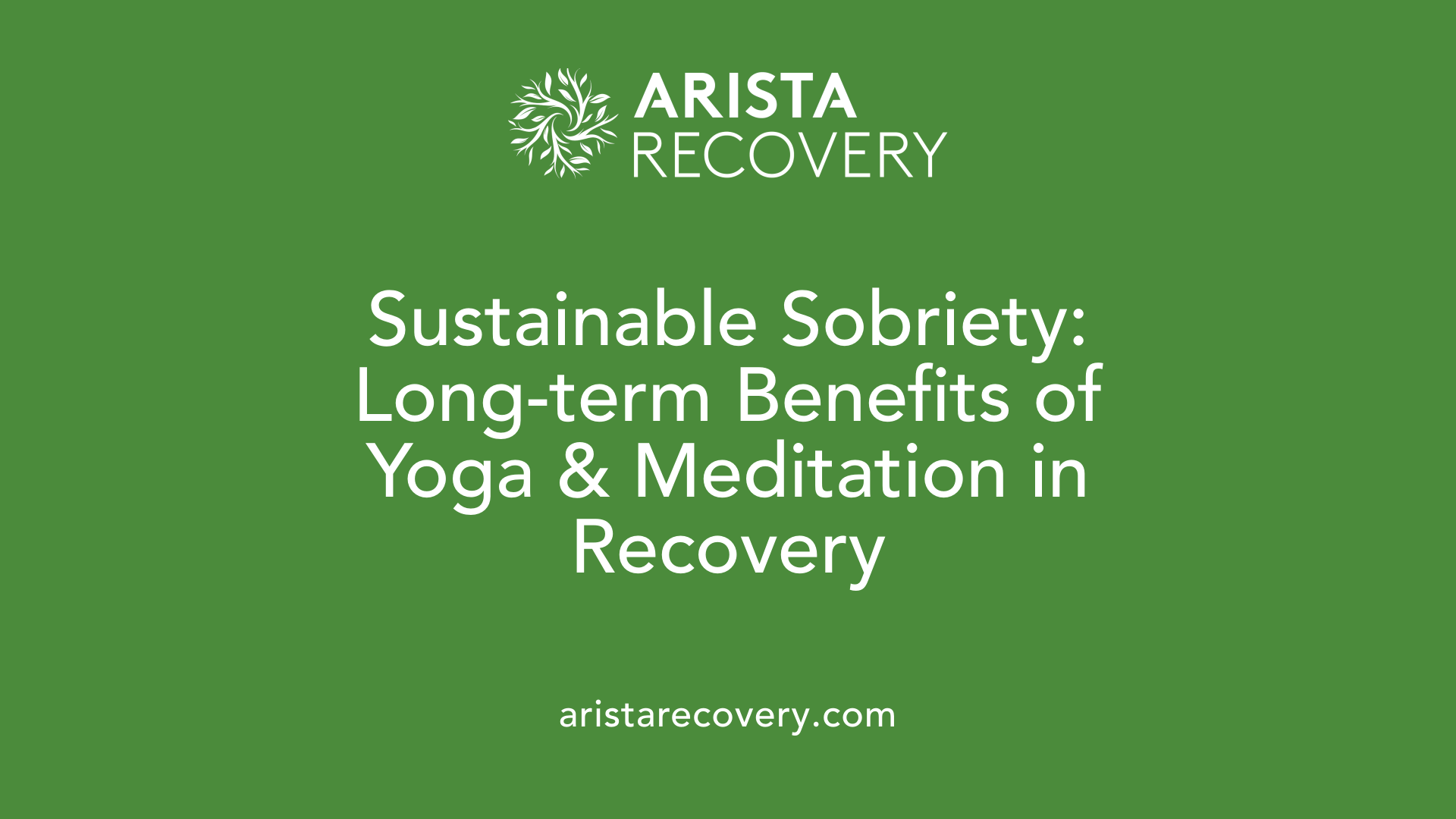
How do yoga and meditation help maintain healthy habits after addiction treatment?
Practicing yoga and meditation regularly supports individuals in maintaining healthy habits by fostering mindfulness and self-awareness. These practices encourage people to stay connected with their physical and emotional states, making it easier to recognize early signs of stress, cravings, or emotional distress. By developing a routine that emphasizes self-care, relaxation, and mental clarity, individuals can sustain positive lifestyle choices that reinforce recovery.
What is the role of yoga and meditation in ongoing recovery?
Yoga and meditation serve as continuous tools in recovery by reducing stress, regulating emotions, and enhancing mental resilience. They help manage the mental health challenges often associated with addiction, such as anxiety and depression, which are common relapse triggers. Additionally, these practices strengthen the mind-body connection, supporting emotional stability and providing a sense of inner peace that encourages long-term sobriety.
How do community support groups incorporating yoga benefit those in recovery?
Joining yoga groups or classes creates a sense of community and shared purpose. These groups offer social support, encouragement, and accountability, which are vital for maintaining sobriety. The collective environment promotes mutual understanding and reduces feelings of loneliness or isolation, fostering a supportive network that sustains motivation and commitment to long-term recovery.
How does addressing co-occurring mental health conditions through yoga and meditation improve recovery?
Many individuals recovering from addiction also face mental health issues such as anxiety, depression, or trauma. Yoga and meditation are effective in addressing these conditions by calming the nervous system, promoting emotional regulation, and improving mood. As a result, they help reduce symptoms and behavioral triggers linked to mental health, making relapse less likely. Integrating these practices into treatment supports a comprehensive approach to mental wellness and sobriety.
| Aspect | Benefit | How Yoga and Meditation Contribute |
|---|---|---|
| Detoxification | Promotes removal of toxins | Supports circulation and oxygen flow, aiding body detox |
| Mental health management | Reduces anxiety and depression | Calms the nervous system, releases mood-enhancing chemicals |
| Relapse prevention | Enhances self-awareness and emotional resilience | Recognizes triggers early, cultivates coping strategies |
| Community support | Provides social connection | Facilitates participation in group classes and shared growth |
| Co-occurring conditions | Addresses trauma, anxiety, depression | Improves emotional regulation and mental stability |
In conclusion, integrating yoga and meditation into long-term recovery plans offers ongoing mental, emotional, and physical benefits. These practices help individuals establish a balanced, mindful approach to life that supports relapse prevention, enhances well-being, and fosters a resilient, healthy lifestyle.
Supporting Long-Term Sobriety and Mental Health
Incorporating yoga and meditation into rehab programs offers a multifaceted approach that addresses the physical, emotional, and spiritual roots of addiction. These practices not only assist in managing withdrawal symptoms and cravings but also promote mental clarity, emotional stability, and resilience, essential for sustaining long-term sobriety. As scientific research continues to validate their benefits, more treatment centers are adopting yoga and meditation as core components of holistic care, enhancing the prospects for lasting recovery and overall well-being. Engaging regularly in these practices can build a foundation of inner strength, mindfulness, and healthy habits that empower individuals on their journey to lasting health and happiness.
References
- Yoga for Drug Addiction, Withdrawal & Recovery
- Benefits of Yoga | Addiction Treatment - Washburn House
- The Role of Yoga and Mediation in Addiction Recovery
- The Top Benefits of Yoga for Those in Recovery - High Focus Centers
- The Benefits of Yoga and Meditation in Drug or Alcohol Detox
- Mind-Body Connection: Yoga and Meditation in Outpatient Rehab
- The Benefits of Yoga and Meditation for Addiction Recovery
- The Incredible Benefits of Yoga for Addiction Recovery
- Benefits of Yoga During Recovery - Promises Behavioral Health
When mental health challenges and addiction intersect, it can feel isolating. At Arista, we offer compassionate, evidence-based, and trauma-informed care to help you heal, grow, and move forward.
You’re not alone in this.
When mental health challenges and addiction intersect, it can feel isolating. At Arista, we offer compassionate, evidence-based, and trauma-informed care to help you heal, grow, and move forward.
Support that moves with you.
You’ve taken a brave first step. At Arista Recovery, we’re here to help you continue with best-in-class care designed for long-term healing and support.
.webp)






